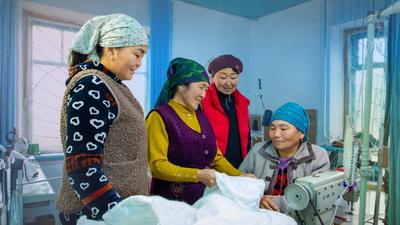-
Our work
-
Fields of work
- Arms control
- Border management
- Combating trafficking in human beings
- Conflict prevention and resolution
- Countering terrorism
- Cyber/ICT Security
- Democratization
- Economic activities
- Education
- Elections
- Environmental activities
- Gender equality
- Good governance
- Human rights
- Media freedom and development
- Migration
- National minority issues
- Policing
- Reform and co-operation in the security sector
- Roma and Sinti
- Rule of law
- Tolerance and non-discrimination
- Youth
- Field operations
- Projects
-
Meetings and conferences
- Summit meetings
- Review Conferences
- Ministerial Council meetings
- Plenary meetings of the Permanent Council
- Plenary Meetings of the Forum for Security Co-operation
- Security Review Conferences
- Annual Implementation Assessment Meetings
- Economic and Environmental Forum
- Economic and Environmental Dimension Implementation Meetings
- Human rights meetings
- Media conferences
- Cyber/ICT security conferences
- Conference of the Alliance against Trafficking in Persons
- Gender equality conferences
- Annual OSCE Mediterranean conferences
- Annual OSCE Asian conferences
- Partnerships
-
Fields of work
-
Countries
- All
-
Participating States
- Albania
- Andorra
- Armenia
- Austria
- Azerbaijan
- Belgium
- Belarus
- Bosnia and Herzegovina
- Bulgaria
- Canada
- Croatia
- Cyprus
- Czechia
- Denmark
- Estonia
- Finland
- France
- Georgia
- Germany
- Greece
- Holy See
- Hungary
- Iceland
- Ireland
- Italy
- Kazakhstan
- Kyrgyzstan
- Latvia
- Liechtenstein
- Lithuania
- Luxembourg
- Malta
- Moldova
- Monaco
- Mongolia
- Montenegro
- The Netherlands
- North Macedonia
- Norway
- Poland
- Portugal
- Romania
- Russian Federation
- San Marino
- Serbia
- Slovakia
- Slovenia
- Spain
- Sweden
- Switzerland – OSCE Chairpersonship 2026
- Tajikistan
- Türkiye
- Turkmenistan
- Ukraine
- United Kingdom
- United States of America
- Uzbekistan
- Asian Partners for Co-operation
- Mediterranean Partners for Co-operation
-
Structures and institutions
- Chairpersonship
-
Secretariat
- Secretary General
- Office of the Secretary General
- Conflict Prevention Centre
- Transnational Threats Department
- Office of the Special Representative and Co-ordinator for Combating Trafficking in Human Beings
- Office of the Co-ordinator of OSCE Economic and Environmental Activities
- Gender Issues Programme
- Opportunities for Youth
- Department of Human Resources
- Department of Management and Finance
- Office of Internal Oversight
- Documentation Centre in Prague
- Institutions
-
Field operations
- Presence in Albania
- Centre in Ashgabat
- Programme Office in Astana
- Programme Office in Bishkek
- Mission to Bosnia and Herzegovina
- Programme Office in Dushanbe
- Mission in Kosovo
- Mission to Moldova
- Mission to Montenegro
- Mission to Serbia
- Mission to Skopje
- Project Co-ordinator in Uzbekistan
- Closed field activities
- Parliamentary Assembly
- Court of Conciliation and Arbitration
- Organizational structure
- About us

Story
'Profound and rapid change': the 20th anniversary of the Bonn Document on Economic Co-operation
- Date:
- Source:
- OSCE Secretariat
- Fields of work:
- Economic activities
Affirming the importance of economic co-operation and policies to support sustainable investment and growth is a far from radical proposition. But the OSCE's Bonn Document on Economic Co-operation - which marks its 20th anniversary on 11 April - was agreed by OSCE participating States "at a time of profound and rapid change", when the Iron Curtain was falling but stark differences in prosperity still marked the divide between East and West.
The countries of the Eastern Bloc were making the often painful transition to market economies, and the Bonn Document represented an important commitment by all the OSCE states to support this process, based on the principle of indivisible security.
"Twenty years later, at a time when the OSCE region is still reeling from the effects of the economic crisis, the Bonn Document reminds us that equal access to economic opportunity and prosperity are critical aspects of stability and security," says OSCE Co-ordinator of OSCE Economic and Environmental Activities Goran Svilanovic. "The Bonn Document marked a considerable strengthening of the OSCE's mandate in the economic sphere, and continues to be a basis for our work today, for example on issues such as improving investment climate, including support for small and medium sized enterprises."
Linking economic freedom to human rights
The Bonn Document, signed by the 35 States in the then-Conference on Security and Co-operation in Europe, was primarily seen as a declaration in favour of the market economy - something that is taken as a given in most of the OSCE states today - but it also demonstrated the OSCE's indivisible security concept, linking economic development to the rule of law, human rights and democracy.
"We all recognize that economic productivity and individual freedom to develop are inseparably intertwined in an open and pluralistic society. The Bonn Document is thus an expression of the essence of the CSCECSCE
Conference on Security and Co-operation in Europe, with human beings at the core," then-West Germany's Minister for Economic Affairs Helmut Haussman declared at the Bonn Conference.
Before Bonn, the economic co-operation of the "second basket" of the Helsinki Process was limited to promoting trade, business contacts and industrial co-operation between East and West while maintaining an awareness of "the diversity of their economic and social systems".
The Bonn Document thus marked a shift in the shared values of OSCE states, who declared their support for market reform, the international economic and financial system, free enterprise and private property. In the Document, the OSCE States recognized "the relationship between political pluralism and market economies" and declared that "democratic institutions and economic freedom foster economic and social progress".
The States also pledged to uphold the principle of "economic activity that accordingly upholds human dignity", which speaks out against forced labour, discrimination and stands up for employment rights. The OSCE's continued focus on regional co-operation to combat trafficking in human beings and help minorities and women participate fully and without discrimination in the economic life of their countries is an important affirmation of this commitment.
Towards a free Europe
Leaders at the 1990 Bonn Conference clearly recognized that times were changing - and changing profoundly. As Chancellor Helmut Kohl said in his Bonn address, "In a time of rapid change, in which opportunities and risks exist side by side, the rigorous continuation of the CSCE process is a decisive contribution to the development of lasting stability."
The OSCE States seized the moment by building on the Helsinki Process with new and radical commitments for a freer and less divided Europe, first in Bonn, then in Copenhagen and finally in Paris.
The achievements since then have been remarkable - the commitment to the market economy and other principles outlined in the Bonn Document helped the economically troubled countries of the former Eastern Bloc on the path not only to greater prosperity and closer economic co-operation but in some cases to full European Union membership.
"The world as well as the political map of Europe and Central Asia have much changed since the Bonn Conference - instead of the then 35 CSCE participating states the OSCE comprises today 56 countries and co-operation among them has intensified considerably over the past decades," says Ambassador Heiner Horsten, Germany's Permanent Representative to the OSCE. "However, the goals set out by participating States in Bonn of sustainable economic growth, a rising standard of living, an improved quality of life, expanding employment, efficient use of economic resources, and protection of the environment remain valid and are more relevant than ever."
OSCE Impact
Discover more stories about how the OSCE improves lives.

